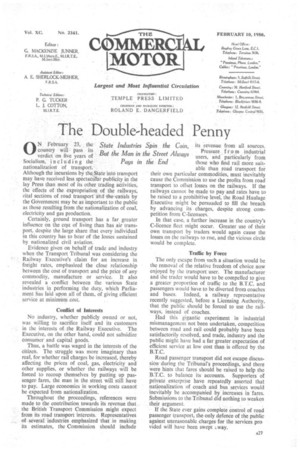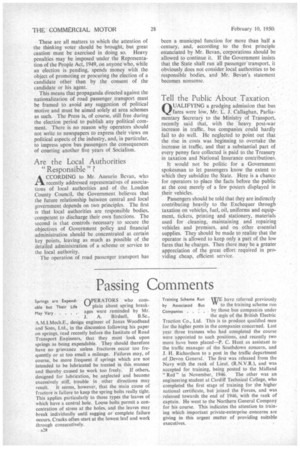The Double-headed Penny
Page 29

Page 30

If you've noticed an error in this article please click here to report it so we can fix it.
0 N 'country will wi pass its II. ; a . February 23, the StateIndustries verdict on five years of DirtMe man in • Socialism; including the Pays in nationalization' of transport. Although the incursions by the State into transport may have received less spectacular publicity in the lay .Press than most of its other trading activities, the effects of. the expropriation of the railways', vital sections of road transport and the canals by the Government may be as important to the public as those resulting from the nationalization of coal, electricity and gas production. Certainly, ground transport has a far greater influence on the cost of living than has air transport, despite the large share that every individual in this country has to bear of the losses sustained by nationalized civil aviation. Evidence given on behalf of trade and industry when-the Transport Tribunal was considering the Railway Executive's claim for an increase in freight rates, emphasized the close relationship between the cost of transport and the price of any commodity, manufacture or service. It also revealed a conflict between the various State industries in performing the duty, which Parliament has laid upon all of them, of giving efficient service at minimum cost.
Conflict of Interests No industry, whether publicly owned or not, was willing to sacrifice itself and its customers in the interests of. the Railway Executive. The Executive, on the other hand, could not subsidize eonsurner and capital goods. Thus, a battle was waged in the interests of the citizen. The struggle was more imaginary than real, for whether rail charges be increased, thereby affecting the prices of coal, gas, electricity and other supplies, or whether the railways will be forced to recoup themselves by putting up passenger. fares, the man in the street will still have to pay. Large economies in working costs cannot be expected from nationalization. Throughout the proceedings, references were made to the contribution, towards its revenue that . the British Transport Commission might expect from its road transport interests. Representatives of several industries emphasized -that in making its estimates, the Commission should include Spin the Coin, its revenue from all sources. Pressure f industrial the Street Always users, and particularly from the End . those who find rail more suitable than road transport for their own particular commodities, must inevitably cause the Commission to use the profits from road transport to offset losses on the railways. If the railways cannot be made to pay and rates have to be raised to a prohibitive level, the Road Haulage Executive might be Persuaded to fill the breach by advancing its charges, despite strong competition from C-licensees. In that case, a further increase in the country's C-licence fleet might occur. Greater use of their own transport by traders would again cause the losses on the railways to rise, and the vicious circle would be complete.
Traffic by Force The only escape from such a situation would be the removal of the relative freedom of choice now enjoyed by the transport user. The manufacturer and the trader would have to be compelled to give a greater proportion of traffic to the B.T.C. and passengers would have to be diverted from coaches and buses. Indeed, a railway representative recently suggested, before a Licensing Authority. that the public should be forced to use the railways, instead of coaches. Had this gigantic experiment in industrial mismanagement not been undertaken, competition between road and rail could probably have been satisfactorily resolved, and trade, industry and the public might have had a far greater expectation of efficient service at low cost than is offered by the B.T.C.
Road passenger transport did not escape discussion during the Tribunal's proceedings; and there were hints that fares should be raised to help the B.T.C. to balance its accounts. Supporters of private enterprise have repeatedly asserted that nationalization of coach and bus services would inevitably be accompanied by increases in fares. Submissions to the Tribunal did nothing to weaken their argument. If the State ever gains complete control of road passenger transport, the only defence of the public against unreasonable charges -for the services pro vided will have been swept Lway. These are all matters to which the attention of the thinking voter should be brought, but great caution must be exercised in doing so. Heavy penalties may be imposed under the Representation of the People Act, 1949, on anyone who, while an election is pending, spends money with the object of promoting or procuring the election of a candidate other than by the consent of the candidate or his agent.
This means that propaganda directed against the nationalization of road passenger transport must be framed to avoid any suggestion of political motive and must be aimed solely at area schemes as such. The Press is, of course, still free during the election period to publish any political comment. There is no reason why operators should not write to newspapers to express their views on political aspects of the industry, and, in particular, to impress upon bus passengers the consequences of courting another five years of Socialism.
Are the Local Authorities " Responsible " ?
ACCORDING to Mr. Aneurin Bevan, who recently addressed representatives of associations of local authorities and of the London County Council, the Government believes that the future relationship between central and local government depends on two principles. The first is that local authorities are responsible bodies, competent to discharge their own functions. The second is that controls necessary to secure the objectives of Government policy and financial administration should be concentrated at certain key points, leaving as much as possible of the detailed administration of a scheme or service to the local authority.
The operation of road passenger transport has been a municipal function for more than half a century, and, according to the first principle enunciated by Mr. Bevan, corporations should be allowed to continue it. If the Government insists that the State shall run all passenger transport, it obviously does not consider local authorities to be responsible bodies, and Mr. Bevan's statement becomes nonsense.
Tell the Public About Taxation
QUALIFYING a grudging admission that bus fares were low, Mr. IL. J. Callaghan, Parliamentary Secretary to the Ministry of Transport, recently said that, with the heavy post-war increase in traffic, bus companies could hardly fail to do well. He neglected to point out that the rise in costs was beginning to overtake the increase in traffic, and that a substantial part of every penny fare collected is paid to the Treasury in taxation and National Insurance contributions.
It would not be politic for a Government spokesman to let passengers know the extent to which they subsidize the State. Here is a chance for operators to place the facts before the public at the cost merely of a few posters displayed in their vehicles.
Passengers should be told that they are indirectly contributing heavily to the Exchequer through taxation on vehicles, fuel, oil, uniforms and equipment, tickets, printing and stationery, materials used for cleaning, maintaining and repairing vehicles and premises, and on other essential supplies. They should be made to realize that the operator is allowed to keep only a part of the low fares that he charges. Then there may be a greater appreciation of the great effort required in providing cheap, efficient service.




















































































